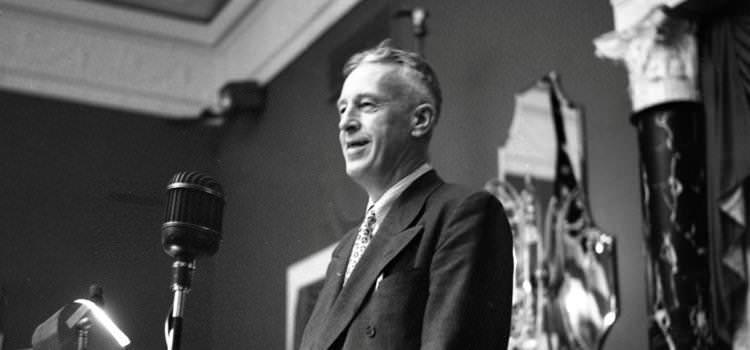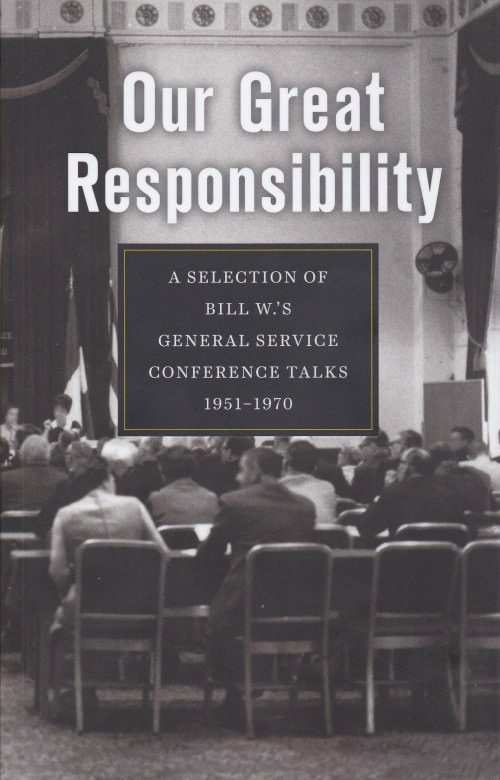Variations in Form of the Twelve Steps and Twelve Traditions

This summary of Bill’s talk has been posted online on various sites. It was included in the FINAL REPORT – Third General Service Conference of AA (1953) which was initially found on the Silkworth website.
Bill said he proposed to consider “whether this program of ours is frozen as solid as an ice cube, or whether there is any elasticity in it, whether we are going to get into this business of insisting on conformity, whether we are going to get into the business of creating an authority that says: ‘These Steps and Traditions have to be this way.’”
For the first four years, AA had a word-of-mouth program that could be summed up in six steps. As the Big Book was being prepared, it became apparent that the principles of the new program had to be stated, as well as the personal stories. In bed one night, Bill began to write out the steps, sensing only that the “original six” would have to be broken down to make them specific enough and concrete enough for “the distant reader.”
“To my surprise, they came rather quickly and when I had finished, I found they were twelve. It seemed to me that this was quite a happy thought… and that is all I thought about it a t the time. I was only trying to break the program up into such small pieces that nobody would miss an essential point.”
When the Twelve Steps were presented to the other alcoholics in New York, Bill said, a great uproar developed. “My sin was that I had varied the six into twelve:” And a lot of people objected to the references to God in the new steps, as originally presented. “Because of this, we finally got around to the idea of the ‘Higher Power’ or ‘God as you understand Him.’ So the Twelve Steps themselves were a tremendous variation, not in principle, but in the manner of stating them.”

Bill’s talk at the 1953 General Service Conference is included in Our Great Responsibility. Click on the image to access the book at the AAWS Online Store.
This pioneering story is now being reenacted in distant lands. In one country, the Steps have been altered somewhat in phrasing and reduced t o seven. “Do you think we should tell those people: ‘You can’t belong to Alcoholics Anonymous unless you print those Twelve Steps the way we have them?’ No. They are merely going through the old pioneering process we had to go through ourselves.”
Bill told of his surprise when he was presented with a proposed draft of revised Steps to be used in working with seamen who, he has been assured, “were not going to take the Twelve Steps the way they are written.” Examining the “revision”, he was amazed to note that they corresponded, number for number, with the six steps in the original AA word-of-mouth program!
“Where variations of the Traditions are concerned, we’ve gone up and down like a window shade. We even have a Tradition that guarantees the right of any group to vary all of them, if they want to. Let’s remember, we are talking about suggested steps and traditions. And when we say each group is autonomous, that means that it also has a right to be wrong.”
“My feeling is that the more we insist on conformity, the more resistance we create. But if the Traditions and Steps reflect accurately what our experience has been, the alcoholic, no matter where in the world he may be, will eventually adopt the principles that will work the best for him. If our principles are correctly stated, he will adopt them. If any improvements are to come, who can say where they may come from?”

























Statistics show that only 1 in 12 are still in AA after one year. The program itself should humbly ask Him to remove whatever shortcomings drove the 11 away. Of the original nine AA alcoholic trustees on the GSO board, the best exemplars the program could put forward, two relapsed for good. A little humility does anybody good.
Jeff. I’d be most interested in seeing those statistics, Could you share a link to them? Thanks.
Those figures come from studies referenced in “The Sober Truth” by Dr. Lance Dodes.
Thanks, Jeff. I’m always a bit skeptical when I read of AA “success” statistics. I took the time to look into Dr. Dodes 2014 publication and also some of the reviews of that book. Although this, at this time, is not the forum to discuss AA success or failure, I’d invite readers to investigate Dr. Dodes’ work for themselves.
I believe, especially in times of turmoil, and in need of course corrections, it is very assuring to have a written plan. A long standing program with the law and much of mental health on-board. It reminds me of many things where any dissension is met as heresy. The solution is treated as though, even if it weren’t to work we needed to shut up and not ruin its placebo effect. You must fully comply, because the thing cannot stand up to criticism. Christianity for one always asks for full compliance. You’re on-board with The Word (bible) as that of your God – don’t question it. It is not surprising the 12 steps and the big book echo as long as it is tied to Christianity and in reality very often churches.
Note – I still recommend the program to those first facing issues. I also let people know that I view it as a fluid process that everyone has to figure out to their own – the failures and successes. The giving in to God is more about giving in to needing a whole bunch of support and self-analysis – AND not drinking at all. Rinse and repeal. AA does that part well, if it doesn’t alienate a person with alternate faith. A place to go instead of the bar or the liquor store is certainly major.
Thank you, Dave. Well said.
Peace,
Ken
Roger,
Perhaps we should change the name of AA Agnostica to Alcoholics for Diversity.
Thanks so much Roger for this most cogent and concise statement of the history of the view of AA’s 12 Steps from our most literate Co-founder who wrote our cherished Big Book. I have been aware for several decades of his sanctioning of the Buddhist version of the Steps but was unaware of the version of the 12 steps that he also sanctioned for seamen which was close to the original 6 steps that he fashioned — Thank You !~!~!
How about that!
The link to the “Final Report” goes to a completely different talk … curious, eh? The one in the Our Great Responsibility book is the one to which you refer and quote at length, but the one in the PDF is called “The Milestones Ahead” … just one of those curiosities one often finds in archival research, eh?
THANKS for this! The longer he stayed sober, the more Bill became rational and tolerant. Too many present members don’t know this, and insist nothing should ever change, so the secular AA movement scares them.
I collected all the Bill W. statements related to his nondogmatism I could find, but then lost it. Is there a compilation somewhere?
That would be a very useful document indeed.
There is this document put together by Thomas B: Relevant Quotes for Secular AA.
What do you think? If you want to add things to it, send it along! I’m sure Thomas wouldn’t mind.
Great article. I have been trying in vain to get the rank and file members of what they call “traditional” AA to read any of Bill W’s later thoughts. It’s not really a matter of elasticity but of evolution.
Maybe these folks are also of the anti-vaccine and flat earth ilk.
Bill never said AA’s were not allowed any deviance from “his” suggested program of recovery. Somehow the dogma has devolved into scripture.
I second that, feels more inclusive rather than unique as “We Agnostics”.
Flexibility and willingness to evolve is the key to AAs survival. Kudos to Bill for the foresight to see it and the fortitude to express it.
Now that I have re-read the article, I noticed it says the Traditions are suggested. 38 years of reading this stuff and I have never seen or heard that. Can anyone tell me where that is written? It’s news to me.
Bill W. 1953 address to the General Service Conference. Text of the speech appears in “Our Great Responsibility”.
The whole of the AA program is suggested.